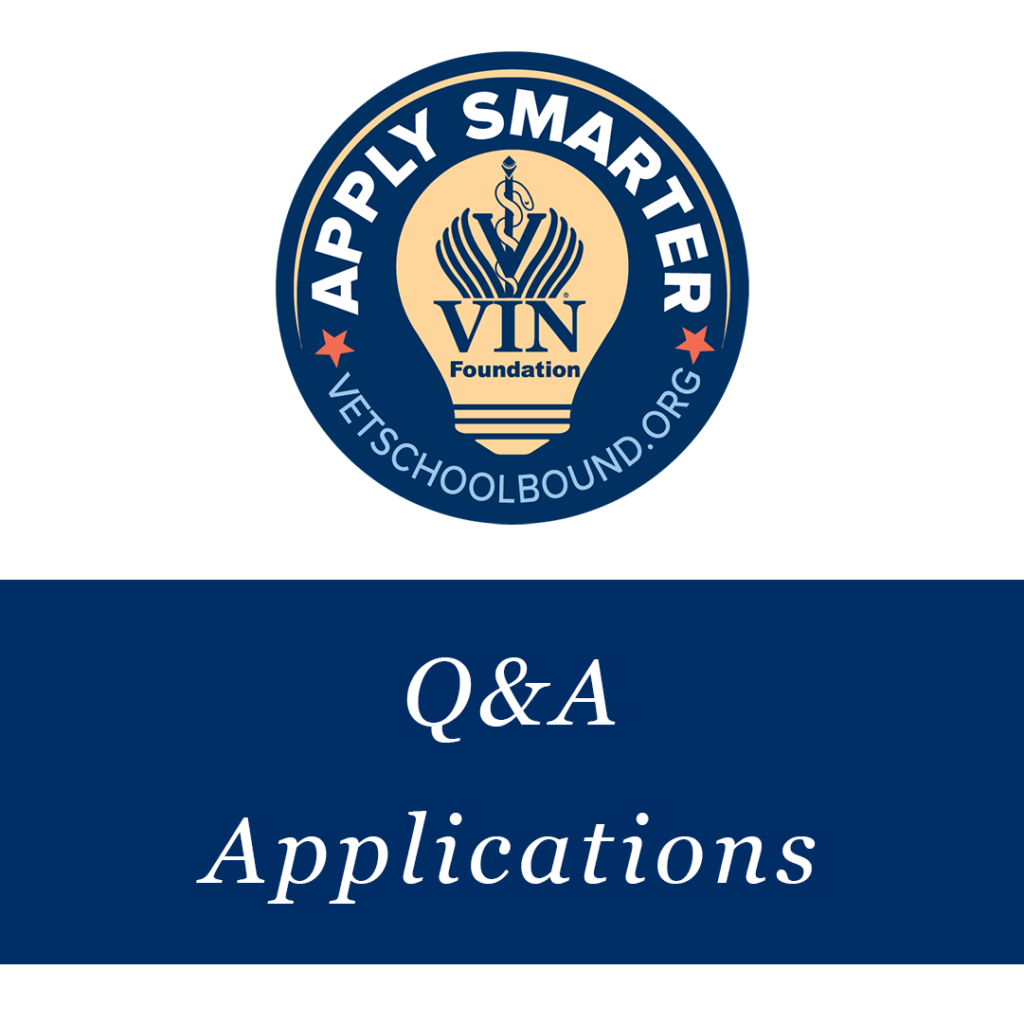Below we highlight a few frequently asked pre-veterinary school questions and provide detailed answers about VETERINARY SCHOOL APPLICATION:
We also have frequently asked questions and detailed answers about veterinary student loans and veterinary income.
“The GRE is not required at some veterinary schools because of COVID, any idea if that’s gonna be permanent or if they might add it to the list of requirements if this calms down?”
For schools that have made that change for this cycle, the requirements should not change before this year’s application deadline, September 15, 2020. For next year and/or beyond, each school will have its own plan and policy regarding the GRE. So schools have been eliminating the GRE requirement. There is a good list of those schools on the AAVMC general information chart, “Test Requirements” column. If a school’s website doesn’t make a requirement clear, we recommend reaching out to the school directly for the most accurate information.
“Is it just me or did anyone else also have difficulty getting shadowing hours and volunteer hours because of COVID? :(“
“How will veterinary schools be considering lack of shadowing and vet service when it comes to the pandemic problems? Is it better to try another year?”
These are questions best directed to the school’s you are applying to, and an excellent reason to reach out to them to let them know of your interest 🙂 Remember the “X-factor” we talked about during the Apply Smarter webinar? Generally speaking, limited experience due to COVID-19 is a common challenge for all of this year’s applicants. Schools are aware of that, and will likely take that into consideration. Specifically speaking, we recommend reaching out to schools you’re applying to ahead of time with your details. If your lack of experience is only due to COVID, it will probably not disqualify you, and knowing that will hopefully give you peace of mind. If it does, at least you know sooner than later and you can use the time and application money on other plans.
“If you are from a state that does not have a veterinary school, is it possible to get in-state tuition in a different state?”
Yes. There are three ways to receive in-state tuition to veterinary school:
- meet the residency requirements for the state veterinary school(s) you are applying to;
- explore contractual arrangements that your state may have with a particular veterinary school (ie WICHE, SREB);
- apply to veterinary schools that allow you to receive in-state tuition after the first year. Currently, Missouri, Ohio State, North Carolina State, University of California – Davis, and Washington State offer this opportunity.
“How would you suggest picking schools? I have only one in state option (UC-Davis) since Western University is private.”
Using the principles of Apply Smarter, I would use the VIN Foundation Cost of Education Map to find the least costly schools based on your state of residence. You should see several options cluster around a lower price point before the next set of choices jumps appreciably in cost.
Focus on the schools that fall into that lower price point. Those will usually be your in-state school and schools where you can obtain in-state residency after your first year.
“Is it wise to sit out a year and reapply if I don’t get in to my in-state on my first try?”
“If your in-state school is private (such as UPenn) and you don’t get in, is it still better financially to wait a year to reapply?”
It depends 🙂 If I didn’t get in on first application to one of my lowest cost options, I would want to get as much information as possible from the school. What parts of the application do they recommend strengthening? If those are items I feel confident I can address, then yes, I think it is best to work on those and apply the following year.
If I get the sense that I have more to change than I can in a single application cycle, I might start investigating other schools. I will still follow the Apply Smarter concepts. That might include moving to another state to apply to a different school as resident. However, I want to be sure I can obtain residency in any state I move to for the purpose of applying to veterinary school.
Other significant considerations are:
- your ability to support a move or another application cycle
- the time it takes to attain an income-generating position as a veterinarian,
- and your comfort with your alternatives.
For example, let’s say you don’t get accepted at a school that would cost you between $120,000 and $150,000. Are you comfortable with being accepted at a school with a cost profile over $250,000? Are you okay with how that may change your post-graduation plans? Are you comfortable and/or able to postpone admission for another year or more to obtain a lower cost education?
Answer these questions before you apply because the decision is much more difficult to navigate after you’ve applied.
“What if your in-state school is more expensive than some out-of-state schools?”
The magnitude of the cost difference matters. When you’re reviewing the VIN Foundation Cost of Education Map, if your in-state option is number 2 or 3 behind another school that is just slightly less expensive, then you’re still Applying Smarter by targeting your in-state school.
However, if you’re in-state option is much more expensive than other choices, then focus on the choices which allow you the lower cost. For example, you can always target the five schools which allow you to obtain in-state residency after the first year.
“What would you suggest for those who don’t have a choice but to be a non-resident applicant?”
You can always target the five schools which allow you to obtain in-state residency after the first year. You also have the option of moving to another state that would allow you to apply as a resident to a school of your choice.
Have more questions? Post a comment below or email studentdebt@VINFoundation.org.

Tony Bartels, DVM, MBA
Dr. Tony Bartels graduated in 2012 from the Colorado State University combined MBA/DVM program and is an employee of the Veterinary Information Network (VIN) and a VIN Foundation Board member. He and his wife have more than $400,000 in veterinary-school debt that they manage using federal income-driven repayment plans. By necessity (and now obsession), his professional activities include researching and speaking on veterinary-student debt, providing guidance to colleagues on loan-repayment strategies and contributing to VIN Foundation initiatives.



2 thoughts on “Apply Smarter Q&A: Vet School Application Questions”
Hello! I was just accepted into St. Matthews university in the Grand Cayman for veterinary school. I am having a lot of trouble finding a place that will give me a loan since they are still non-accredited. Any info on where I can look?
Hi Jaclyn, Congrats on your acceptance! Since St. Matthew’s is a non-accredited international veterinary school, you would not be eligible for U.S. federal student loans to cover your tuition, fees, and living expenses. That leaves private loan funding through banks or other lenders to help cover those costs. There is quite a bit of risk financing something like a veterinary education with all private loans since private loans do not have the same protections or repayment benefits that U.S. federal student loans provide. So unless you can keep those loan balances to an amount that would not exceed what you expect to earn in your first year after graduation, I would encourage you to look more closely at accredited veterinary school options that will allow you to apply for U.S. federal student loans. Hope that helps!